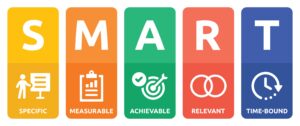
Finances can be an overwhelming especially for young professionals with limited time. With long time horizons to work and grow your assets, it may not seem important to establish concrete financial goals. However, the moves you make now can set the stage for a lifetime of financial security.
Setting financial goals will help you prioritize how you spend your money, gain more confidence in your money management, and ultimately decrease stress. By defining a financial goal, you will be more disciplined and focused on achieving it.
What are some common financial goals?
- Establish an emergency fund
- Pay down student loans or credit card debt
- Buy a new car or a house
- Save for retirement

- Specific: Your goal should be well-defined (i.e., buy a Subaru or Tesla).
-
Measurable: Express your goals in clear numbers, so you’ll know where you are and when you’ve succeeded. How much will this goal cost?
-
Achievable: One of the biggest obstacles to achieving a goal is setting your expectations too high. Do you have the resources to achieve this goal in a reasonable time frame?
-
Relevant: Is this goal compatible with your values and long-term objectives?
- Time-bound: What is the time horizon of your goal? Do you want to accomplish this in the next few months, year, 10 years? Understanding the time horizon associated with your goals can impact your investment and savings strategies.
Take Action Now!
- Review our financial checklist for young professionals.
- Define some goals and quantify each.
- Assign a time frame to each goal. When do you want to accomplish the goal?
- Map out how you will get there. Determine how much of your income or assets you can dedicate to each of your goals.